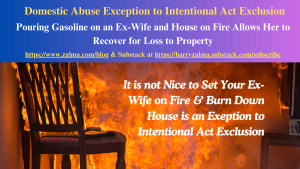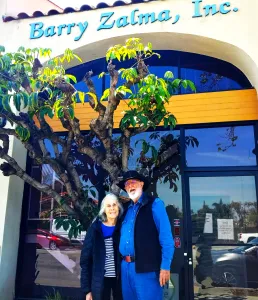Domestic Abuse Exception to Intentional Act Exclusion

See the full video at https://rumble.com/v5e9fqb-domestic-abuse-exception-to-intentional-act-exclusion.html and at https://youtu.be/fXx8N3l_w6w
Brenda Welch owned a home in Lynnwood, and lived there throughout her marriage to David Morgan. The home was subject to a mortgage held by CitiMortgage Inc. During their marriage, Welch and her ex-husband David Morgan had one child together, K.W.
On May 21, 2014, the court finalized their divorce, awarding Morgan the family home and requiring that he “either sell the property or refinance the debts into his sole name within three (3) years of February 25, 2014.” After the divorce, Welch met a new partner and moved in with him. Still, Welch and Morgan shared custody of K.W., and their parenting plan called for joint decision-making.
On November 16, 2014, Welch went to the Lynnwood home at a prearranged time to pick up K.W. from Morgan’s care. But K.W. was not there. Instead, Morgan attacked Welch, beat her unconscious, doused her in gasoline, and set her and the house on fire. Welch survived but suffered significant mental and physical injuries. The fire destroyed the house.
In Brenda Welch v. Pemco Mutual Insurance Company, No. 85466-6-I, Court of Appeals of Washington (September 3, 2024) PEMCO Mutual Insurance Company denied Brenda Welch insurance coverage for loss incurred after her ex-husband assaulted her and burned down their former marital home. PEMCO determined that the loss was intentional and rejected Welch’s argument that the loss arose from an act of domestic abuse, an exception to the intentional loss exclusion. Welch sued PEMCO. The trial court dismissed Welch’s claims at summary judgment.
THE INSURANCE CLAIM
At the time of the fire, Morgan had not yet sold or refinanced the Lynnwood home. So, the deed still named Welch as an owner and obligor on the mortgage. Welch and Morgan held an all-risk insurance policy on the property through PEMCO. The policy named both Welch and Morgan as insureds. It also listed CitiMortgage as a mortgagee.
The PEMCO policy excluded coverage for “any loss arising out of any act committed by or at the direction of an insured with the intent to cause a loss.” But it has an exception to that intentional loss exclusion for acts of “domestic abuse,” which provides that the exclusion “will not apply to deny an insured’s claim for an otherwise covered property loss if such loss is caused by an act of domestic abuse by another insured under the policy.”
A jury found Morgan guilty of attempted first degree murder domestic violence and first degree arson domestic violence. The trial court sentenced him to 260 months in prison. Welch then sued Morgan for her injuries from the assault. Morgan did not respond, and the trial court entered a default order and judgment against Morgan for $5.06 million. Welch also claimed coverage under the PEMCO policy. And CitiMortgage claimed coverage for the outstanding balance on the mortgage. PEMCO estimated the repair or replacement cost of the damage to the home was $463,732.82.
In June 2016, PEMCO found coverage for CitiMortgage but PEMCO denied Welch’s claim. It explained that the intentional loss provision “precludes coverage not only to the arsonist but to any insured, including Ms. Welch.”
Welch sued PEMCO. The trial court granted in part and denied in part PEMCO’s motion. The court denied PEMCO’s motion on the applicability of the domestic abuse exception. It concluded that Welch and Morgan were not family, so the domestic abuse exception to the intentional loss exclusion did not apply.
ANALYSIS
The Court of Appeals must construe insurance policies as the average person purchasing insurance would. That is, give the language a fair, reasonable, and sensible construction. And the Court of Appeals give undefined terms their plain, ordinary, and popular meaning. The Court of Appeal may turn to the dictionary definition of an undefined term to determine its plain meaning.
Welch’s policy excludes coverage for intentional loss unless “an act of domestic abuse by another insured under the policy” causes the loss. The PEMCO policy language parallels former RCW 48.18.550 (1998), the statute in effect when Morgan tried to kill Welch and burned down the house.
RCW 48.18.550(3) requires insurers to cover intentional loss caused by an act of domestic abuse by another insured under the policy. Modern editions of the dictionary define “family” as “the basic unit in society traditionally consisting of two parents rearing their children,” or “[a] group consisting of parents and their children.” Merriam-Webster Dictionary, (last visited Aug. 20, 2024). Welch meets these definitions because she and Morgan were raising K.W. under a parenting plan that granted them shared custody and called for joint decision-making. As such, they were two parents rearing their child.
An average person purchasing insurance would understand the term “family” under the more modern definition. Because Welch and Morgan share a child that they were raising together, Welch is “family” under the policy’s domestic abuse exception to the intentional loss exclusion. Therefore, the trial court erred by granting summary judgment for PEMCO and refusing to grant partial summary judgment for Welch. Therefore, Summary judgment for PEMCO was reversed and the trial court was directed to enter partial summary judgment for Welch for breach of contract
The exception to the exclusion was found to apply because – although divorced and no longer married – since Welch and Morgan still had joint custody of a child they fit a dictionary definition of “family” sufficient to allow Ms. Welch to recover her share of the insurance recovery over that paid to the mortgagee. Her ex-husband gets nothing and she will never recover the $5 million judgment she obtained against her ex-husband who will be in jail a long, long time.
 (c) 2024 Barry Zalma & ClaimSchool, Inc.
(c) 2024 Barry Zalma & ClaimSchool, Inc.
Please tell your friends and colleagues about this blog and the videos and let them subscribe to the blog and the videos.
Subscribe to my substack at https://barryzalma.substack.com/subscribe
Go to X @bzalma; Go to Newsbreak.com https://www.newsbreak.com/@c/1653419?s=01; Go to Barry Zalma videos at Rumble.com at https://rumble.com/account/content?type=all; Go to Barry Zalma on YouTube- https://www.youtube.com/channel/UCysiZklEtxZsSF9DfC0Expg
Go to the Insurance Claims Library – https://lnkd.in/gwEYk
Like this:
Loading…







